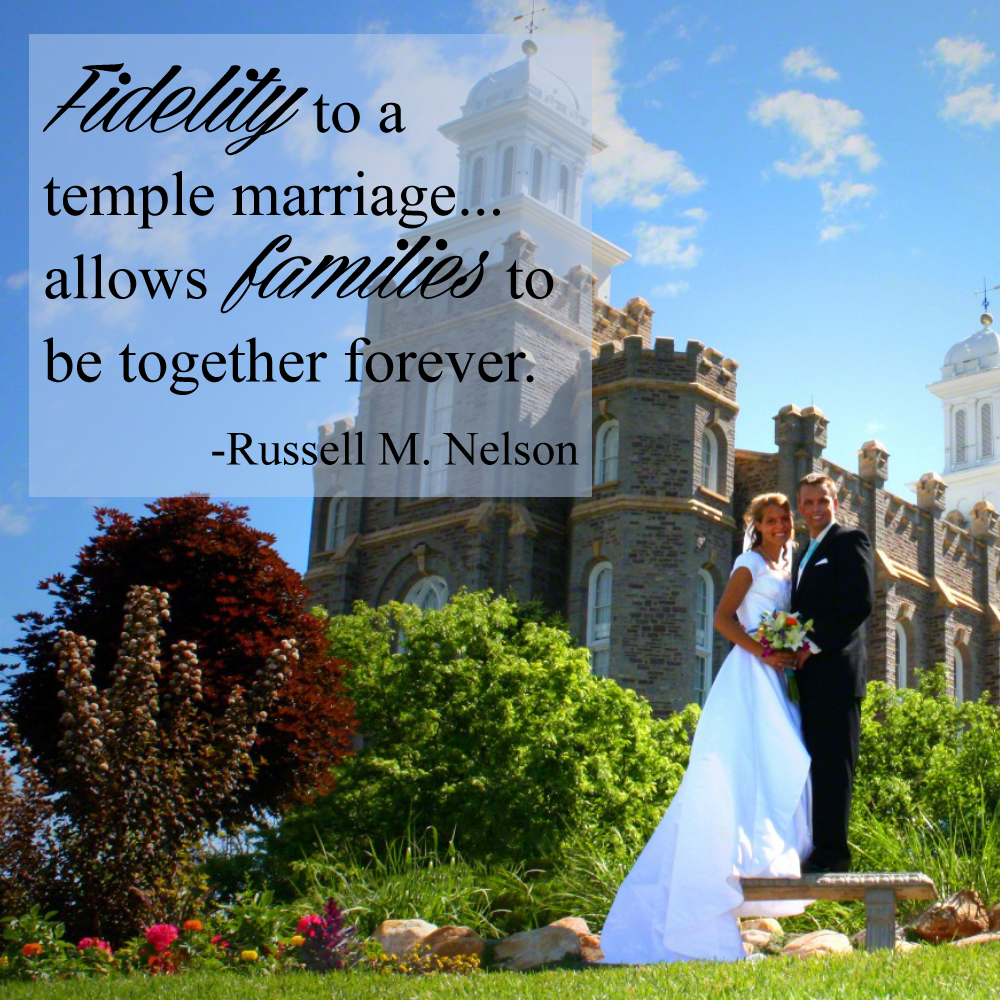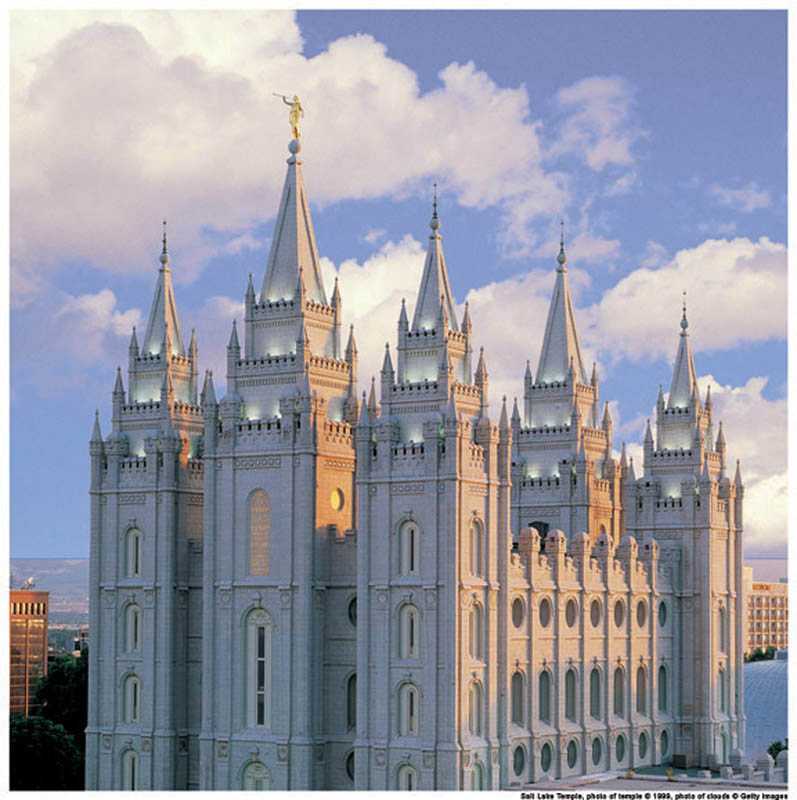It is a central part of Mormon beliefs that families are meant to last forever. Although many religions teach that death also leads to forced divorce, Mormons believe that God created families and counseled against divorce. Therefore he would not force people to get divorced at any time, even after death, without a chance to keep their families forever.
Mormons refer to being married forever as being “sealed.” In other words, they are joined together forever, along with their children, parents, and other family members. This sealing can happen only in a temple, which is different from an ordinary Mormon meetinghouse.
Mormon meetinghouses, found in most towns, are open to the public. Anyone is welcome to attend services on Sundays. Temples do not have Sunday services and are not open to the public. People twelve and older can enter the temple with a special recommend (permit) to do only certain work and they can only be in a small section of the temple. Younger children can enter to the temple to be sealed to their parents if their parents marry in the temple after they are born. Adopted children are also sealed to their new parents there.
Beyond these exceptions, however, Mormons do not get a regular temple recommend until they are adults and have been members of the Mormon Church for at least one year. Once they have this permit, they are able to be married in the temple and to attend temple wedding ceremonies.
Before discussing the wedding, it is important to understand why non-Mormons cannot enter the temple, even to attend the wedding. The temples exist to allow faithful Mormons who have proven themselves to be dedicated followers of Jesus Christ to take on additional covenants with God. A covenant is a two-way covenant with God. God sets the terms of the covenant, and if we do our part, God promises to keep His part of the promise as well. The first covenant occurs at baptism when people covenant to take on themselves the name of Jesus Christ and to keep the commandments. This occurs at age eight or older. In the temple, the covenants come with greater responsibility and greater consequences if violated. Mormons commit to live their religion and to care for their families. They learn more about their religion.
I sometimes use the analogy of a college class. If you decided to sign up for advanced physics when you’d never had a physics class in your life, you would fail. You would not have the background knowledge to carry out the experiments, to understand the textbook or to do what is required of you. You need a solid foundation in the material being taught before you can tackle the advanced class.
Someone who decided to become a police officer or firefighter without undergoing any training would endanger himself and those with whom he worked and those he served. These jobs require a level of skill and experience. Doctors don’t start by doing surgery; they start by learning and observing.
In the same way, God wants us to be prepared for the advanced classes of church membership. When we have a solid foundation in gospel basics and experience in living the gospel, you are prepared to understand the work you are doing in the temple and you are more likely to keep the covenants you will make. Because so much is expected of a temple-recommend holder, a loving God wants them to be prepared and able to live up to those expectations and covenants.
The temple is considered sacred by Mormons. The presence of the Holy Ghost is strong and the feeling is peaceful. It is a time to escape from the world for a few hours into a place where everyone shares your beliefs and standards. To protect this spirit and the sacredness of the building, one must hold a recommend and share in these beliefs and standards in order to enter, even just to witness a baptism.
Before a couple can marry in the temple, they must be interviewed by church leaders to determine worthiness. The wedding is held in a sealing room without ceremony and guests who hold recommends are welcome. The bride wears a modest white wedding dress of her own choosing and the groom wears a white suit. They kneel across the altar holding hands as the officiator speaks to them and declares them married. a reception is held later at home or church and is open to anyone the couple invites. There is one critical difference in that pronouncement of marriage from one done elsewhere, however.
When a couple is married in the temple, the marriage continues not “until death do you part” but “for time and all eternity.” Death does not bring an end to the marriage relationship. For Mormons, marriage is a sacred covenant between husband and wife.
Most people instinctively understand this. Although they are married only for time on earth, and often say they don’t believe in eternal marriage, in the first lonely days after a death, their hearts are often open to the truth.
“Mom and Dad are together again.”
“I will see my baby again when I die.”
“Even though he’s dead, I can feel him nearby sometimes, watching over me.”
Our hearts know the truth: Families are forever. The mind might try to deny it, but it seems odd that we would want to deny something so wonderful. There are few greater gifts God can give to His children than the promise that those they love will be their forever.
A marriage that is going to last forever is special. It helps the couple to tune out the eternally insignificant challenges and to work to strengthen the marriage and to focus on what matters in the eternal scheme of things. For Mormons, family life is a top priority.
First, an eternal marriage is eternal. Eternal implies continuing growth and improvement. It means that man and wife will honestly try to perfect themselves. It means that the marriage relationship is not to be frivolously discarded at the first sign of disagreement or when times get hard. It signifies that love will grow stronger with time and that it extends beyond the grave.
It means that each partner will be blessed with the company of the other partner forever and that problems and differences might as well be resolved because they are not going to go away. Eternal signifies repentance, forgiveness, long-suffering, patience, hope, charity, love, and humility. All of these things are involved in anything that is eternal, and surely we must learn and practice them if we intend to claim an eternal marriage.
Second, an eternal marriage is ordained of God. This means that the parties to the marriage covenant agree to invite God into their marriage, to pray together, to keep the commandments, to keep wants and passions within certain limits that the prophets have outlined. It means to be equal companions and to be just as true and pure outside the home as inside the home. That is part of what ordained of God means.
Third, eternal marriage is a kind of partnership with God. He promises a continuation of lives to those who are sealed together in the temple. There is a oneness with the Creator implied in the commandment given to Adam and Eve to multiply and replenish the earth. There is an obligation to teach children the gospel, for they are His children too. Thus we have family home evening and scripture study, gospel conversations, and service to others. There would seem to be an obligation to support and sustain each other in callings and roles that each is given to perform. How can we claim to be one with God if we cannot sustain one another when the wife is called to serve in the Primary or the husband in the bishopric? (F. Burton Howard, “Eternal Marriage“, Liahona, May 2003, 92–94 )
The late Terrie Lynn Bittner—beloved wife, mother, grandmother, and friend—was the author of two homeschooling books and numerous articles, including several that appeared in Latter-day Saint magazines. She became a member of the Church at the age of 17 and began sharing her faith online in 1992.








This is (almost) perfect. Youth can receive a recommend when they are 12 if they are worthy. This article says 14. This can be used for a year so the youth can go often.
I realize this was written in 2011 but my oldest son who is 30 was able to receive one when he was 12 that was able to be used for a year then. Which would have been 18+ years ago.
I loved the way you explained simply but beautifully why we attend the temple, what we do there, who can come in. Very beautifully written.
Thanks so much.